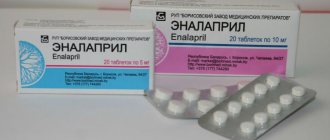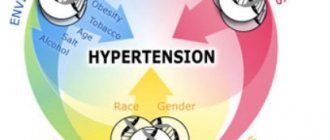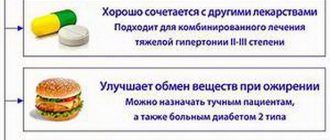Pharmacological properties of the drug Labetalol
Non-selective blocker of β-adrenergic receptors with a selective blocking effect on postsynaptic α1-adrenergic receptors. Due to the presence of two optical centers in the molecule, there are four diastereoisomers of labetalol, which differ in the degree of pharmacological activity. The ratio of β- and α-adrenergic blocking activity of racemic labetalol is 3–7:1. As a result of interaction with α- and β-adrenergic receptors, labetalol causes vasodilation and a decrease in peripheral vascular resistance, leading to a decrease in systemic blood pressure without a significant decrease in cardiac output and the development of reflex tachycardia. The adverse effect of labetalol on the lipid spectrum of blood plasma is minimal. With systematic use, labetalol reduces the severity of left ventricular myocardial hypertrophy in patients with hypertension (arterial hypertension). Labetalol has a quinidine-like membrane-stabilizing effect, which, however, only occurs when labetalol is administered in very high doses. Compared with other beta-adrenergic blockers (eg propranolol), labetalol does not reduce glomerular filtration and renal blood flow. After oral administration, labetalol is rapidly and almost completely absorbed. Concomitant use with food slows down the absorption of labetalol in the intestine, but increases absolute bioavailability. It undergoes significant first-pass metabolism in the mucous membrane of the digestive tract and during the initial passage through the liver, due to which only about 25% of the administered dose of labetalol enters the systemic circulation unchanged. The hypotensive effect develops within 20 minutes - 2 hours after oral administration, the maximum effect occurs after 1-4 hours. The duration of the hypotensive effect is dose-dependent and ranges from 8 to 24 hours. The hypotensive effect after IV administration develops after 2-5 minutes and reaches its maximum expression in 5–15 minutes; its duration is 2–4 hours. The half-life in patients with normal renal function ranges from 2.5–8 hours. With severe renal failure, accumulation of labetalol is possible. Widely distributed in all tissues of the body, penetrates the placenta, and is excreted in breast milk. In small quantities it penetrates the BBB. Extensively metabolized in the liver by glucuronidation. About 30% is excreted in bile and excreted in feces, the rest is excreted in urine (55–60% as metabolites and 5% unchanged).
What kind of medicine is this?
Anti-pressure tablets tenorik reviews
The active ingredient of this medicine is labetalol. It is able to reduce blood pressure due to blocking adrenaline receptors, as well as due to its vasodilating effect. The substance labetalol has antihypertensive, anti-ischemic effects. It has virtually no effect on cardiac output and does not cause reflex tachycardia, which often develops in response to a decrease in pressure. Absorbed into the blood very quickly and excreted in the urine. The advantage of labetalol over other antihypertensive drugs is that it begins to act quickly, and its therapeutic effect lasts for a long time. For example, if the medicine is used intravenously, a decrease in blood pressure levels is observed within 2–5 minutes. With long-term use of this medicine, hypertrophy of the walls of the left ventricle of the heart decreases.
Enter your pressure
Move the sliders
120 by 80
| Release form | Dosage, mg | Quantity per package, pcs. |
| Pills | 100 200 | 30 100 |
| Solution | 50 mg in 5 ml (1%) | 10 |
Pharmacological group of the drug
The action of the drug components is aimed at dilating blood vessels.
The substance labetalol is included in the group of beta-blockers, namely in the subgroup of non-selective hybrid drugs. A group of beta blockers block beta receptors for adrenaline and norepinephrine, which are located in the vascular wall and in the heart. Because labetalol is a hybrid blocker, it primarily acts on beta receptors and also has adrenal alpha blocking properties. Alpha blockers act on alpha receptors for epinephrine and norepinephrine, which are also found in the walls of blood vessels. Due to their dual nature, hybrid blockers promote the expansion of the vascular lumen, reducing overall peripheral vascular resistance. They also have an antiarrhythmic effect and can reduce the heart's need for oxygen.
Indications for the use of Labetalol
There are not many indications for the use of this drug. This medicine is prescribed by a cardiologist in the following situations:
- mono- or complex therapy of arterial hypertension (hypertension);
- relief of hypertensive (hypertensive) crises.
Contraindications for use
There are a number of contraindications to the use of Labetalol, including:
- severe heart failure;
- disruption of the passage of impulses through the heart muscle (atrioventricular, sinoatrial blockade);
- bronchial asthma;
- Prinzmetal vasospastic angina;
- chronic renal failure;
- cardiogenic shock;
- bradycardia (slow heart rate) and bradyarrhythmia;
- acute myocardial infarction;
- individual sensitivity to labetalol or other components of the drug.
Use of the drug Labetalol
In case of hypertensive crisis, it is administered intravenously slowly (over 2 minutes) at a dose of 20 mg (2 ml of 1 % solution). If necessary, the administration is repeated at intervals of 10 minutes. It is preferable to administer labetalol as an infusion in an isotonic solution of sodium chloride or glucose (the concentration of the solution for infusion is 1 mg/ml) at a rate of 2 mg/min. Typically the effective dose is 50–200 mg. The total dose for adults when administered intravenously should not exceed 300 mg. Information on use in children is limited. It is recommended to administer orally at a rate of 4 mg/kg/day in 2 divided doses with constant monitoring of blood pressure levels. When administered intravenously, the bolus dose (administered slowly) is 0.2–1 mg/kg. The initial infusion rate is 0.4–1 mg/kg/h, the maximum is no more than 3 mg/kg/h.
special instructions
Modern means for lowering blood pressure
The use of Labetalol in most cases masks the symptoms of hypoglycemia (tremor, tachycardia or palpitations).
Patients with liver disease should take this drug with extreme caution; When treating with a drug, it is important to regularly carefully monitor the results of indicators of the functional state of the liver. Labetalol is often effective as monotherapy for dissecting aortic aneurysm. Since T1/2 of the drug is very large, it is not recommended to carry out prolonged infusion for patients
Since T1/2 of the drug is very large, it is not recommended to carry out prolonged infusion for patients
Labetalol is often effective as monotherapy for dissecting aortic aneurysm. Since T1/2 of the drug is very large, long-term infusion is not recommended for patients.
Pregnant women can, of course, take this drug, since no bad effects have been identified to date, but before starting therapy, it is very important to assess the potential benefits and possible harm to the child. It is not recommended to take this drug during lactation only because scientists have not yet identified detailed information about the possible penetration of constituent substances into breast milk
It is not recommended to take this drug during lactation only because scientists have not yet identified detailed information about the possible penetration of constituent substances into breast milk.
In cases where a drug is prescribed for a short period of time, but there are no results from its treatment, it is imperative to reconsider the therapy and, if necessary, replace this drug.
Side effects of the drug Labetalol
dizziness, hypertension (arterial hypertension), syncope, orthostatic hypotension (mainly with intravenous administration), sinus bradycardia, AV block, increased symptoms of heart failure, headache, fatigue, depression, nightmares, paresthesia, nausea, vomiting, hepatotoxic effect, shortness of breath, sexual dysfunction (impotence, ejaculation disorders, decreased libido, priapism), urinary retention, hypoglycemia, itching, xerosis and hyperpigmentation of the skin, reversible alopecia, exfoliative dermatitis.
Contraindications
Labetalol is contraindicated in case of hypersensitivity to the drug, cardiogenic shock; GOST standards for myocardial infarction; uncontrolled initial heart failure or heart failure refractory to cardiac glycosides; Prinzmetal's angina; sinoatrial block; AV block II-III degree; for broncho-obstructive diseases or bronchial asthma; untreated pheochromocytoma; bradycardia, arterial hypotension; metabolic acidosis; severe peripheral circulatory disorders. Labetalol is not used in childhood and adolescence. Labetalol is contraindicated during pregnancy and breastfeeding. It is prescribed with caution for severe impairment of liver and kidney function, myasthenia gravis, diabetes mellitus, thyrotoxicosis, and psoriasis.
Drug interactions Labetalol
With simultaneous use of labetalol with other antihypertensive drugs, an additive effect is observed. When prescribed with verapamil or diltiazem, the risk of developing AV block increases. Undesirable pharmacodynamic interactions are possible when combined with the simultaneous use of labetalol and antidiabetic agents. Anesthetics can potentiate and prolong the hypotensive effect of labetalol. The combination of halothane and labetalol may produce a synergistic hypotensive effect, reducing cardiac output and lowering central venous pressure. Labetalol should be used with caution in patients taking MAO inhibitors due to the possibility of developing sinus bradycardia. Cimetidine increases the bioavailability of labetalol when administered concomitantly, probably by increasing absorption or decreasing first pass metabolism. Concomitant use of sympathomimetics may reduce the hypotensive effect of labetalol. Labetalol reduces nitroglycerin-induced reflex tachycardia and has additive hypotensive effects. With simultaneous use of labetalol with tricyclic antidepressants, tremor may develop. When used simultaneously with mefloquine, the risk of developing ECG changes and cardiac arrest increases.
List of pharmacies where you can buy Labetalol:
- Moscow
- Saint Petersburg
Description
The active substance and name are identical - labetalol is the active component of this medicinal product. This ingredient is able to lower blood pressure by blocking adrenergic receptors, and also due to its additional vasodilating effect.
The composition has two main effects - hypotensive and anti-ischemic. They do not affect the volume of cardiac output and do not provoke reflex tachycardia, which is a consequence of a decrease in blood pressure.
The medication is produced in a tablet form familiar to the patient. It is recommended to take pills 3/24 (three times a day) 0.1 g. In case of severe disease, increasing the dosage is possible. The maximum daily dose cannot be higher than 1000 mg, which is divided into 4 oral doses. An alternative to tablets is an injection solution, also sold under the name Labetalol. This solution can be used mainly in inpatient treatment. The fact is that when it is administered, the pressure can drop sharply; it is prohibited to give injections without medical supervision.
Pills can be purchased in two dosages - 100 mg and 200 mg. The number of pieces in a pack is 30 or 100. The solution is purchased packaged in 10 ampoules of 50 mg of the active ingredient in 5 ml each.



